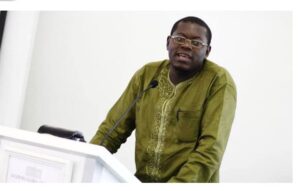Bright Simons Criticizes Jinapor’s “Five Hours of Fuel” Claim, Calls for Focus on Energy Solutions.

Bright Simons, Vice President of IMANI Africa, has sharply criticized Yapei-Kusawgu MP John Abdulai Jinapor over his claim that the outgoing Nana Akufo-Addo administration left the new Mahama government with only five hours’ worth of fuel reserves for power generation.
In a post on X (formerly Twitter) on January 8, 2025, Simons described Jinapor’s statement as “unhelpful and misleading,” warning that such remarks risk confusing the public and diverting attention from critical issues in Ghana’s energy sector.
Jinapor, a former Deputy Minister of Energy and member of Ghana’s energy transition technical committee, made the claim during an informal interview. He alleged that the outgoing Akufo-Addo administration disregarded repeated warnings from the NDC transition team about dwindling fuel supplies, leaving the incoming Mahama government in a precarious position. At President Mahama’s inauguration on January 7, 2025, Jinapor characterized the fuel situation as dire and warned of a looming power crisis.
Bright Simons expressed surprise at the informal manner in which such a significant claim was made, noting that it lacked structured communication. He argued that Jinapor’s comments implied an intentional sabotage of the incoming administration by the previous government, a narrative Simons found speculative and unproductive.
“Delivering such critical information casually does not clarify issues for analysts or the public. It contributes to misinformation,” Simons wrote. He urged the government to focus on resolving Ghana’s systemic energy challenges rather than amplifying temporary fuel concerns.
Simons also questioned why the new administration appears overly focused on liquid fuel shortages when the real issue lies with Ghana’s gas supply. He emphasized that liquid fuels should only serve as a temporary solution for power generation, urging the government to prioritize fixing the gas supply chain.
“Why is there no progress on resolving gas supply challenges? Liquid fuels are supposed to be a stop-gap, not the backbone of our energy production,” Simons stated.
Simons raised concerns about the government’s arrangements for securing emergency liquid fuels, particularly the engagement of Harry Campbell of Stratcon. He criticized the lack of a competitive tendering process and questioned Campbell’s credentials, citing his controversial track record in other countries. Simons demanded transparency regarding the contracts, including any penalties for non-compliance, to ensure national interests are safeguarded.
Simons’ critique underscores the need for a clear strategy to address Ghana’s energy challenges, particularly in ensuring a stable and reliable power supply. While Jinapor’s warnings of a potential power crisis have sparked alarm, experts like Simons argue that the focus should be on long-term solutions, including improving gas infrastructure, diversifying energy sources, and enhancing transparency in fuel procurement.
As Ghanaians grapple with the challenges of energy security, it is imperative for the government to prioritize effective communication and pragmatic solutions over partisan narratives. Both Jinapor and Simons highlight the urgency of addressing the energy crisis, but the path forward must be guided by facts, transparency, and accountability.
This unfolding debate reflects the critical importance of energy to Ghana’s development and the need for collaboration among stakeholders to navigate these pressing challenges.
